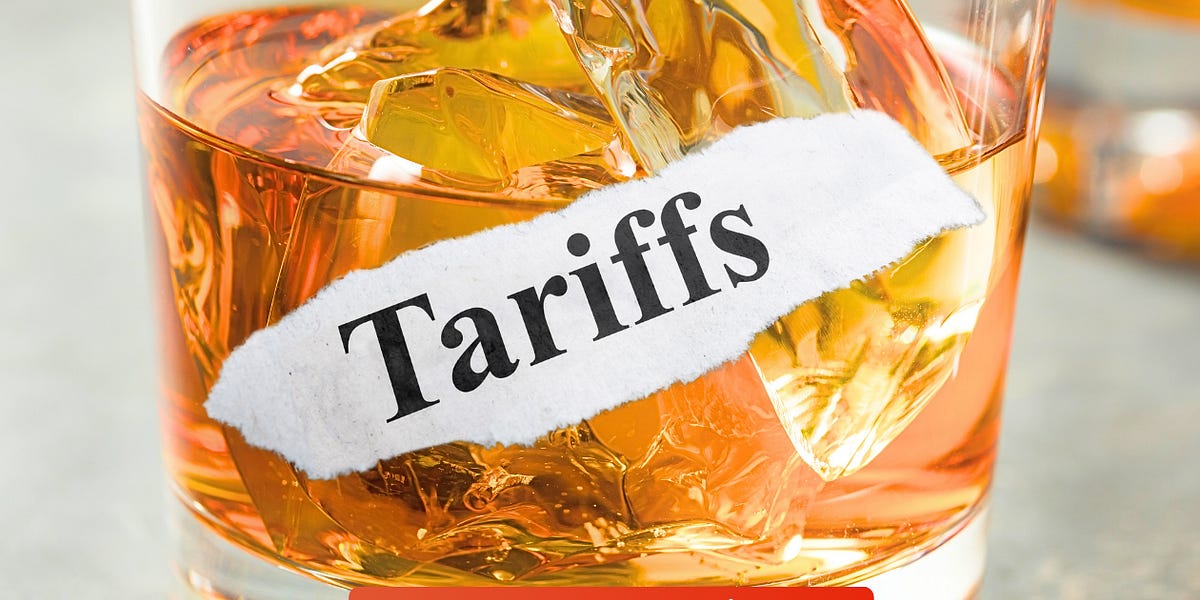How 2025’s Tariff Turmoil Hit American Whiskey and Bourbon

For American whiskey and bourbon distilleries, 2025 has brought a chilling sense of déjà vu, but with the added anxiety of higher stakes. Following a period of strong recovery from the initial 2018 trade war, the industry is once again caught in the crossfire of escalating global trade disputes. The threat of new, higher retaliatory tariffs has not only choked off export growth but has already begun to cause significant financial strain.
The latest wave of trade tension, primarily stemming from the reinstatement and expansion of U.S. tariffs on imported steel and aluminum, immediately triggered countermeasures from America’s largest trading partners. Bourbon, a high profile, politically symbolic American product, was once again placed squarely on the retaliation lists.
Europe: From Recovery to Relapse
The European Union is the single most important export market for U.S. spirits, accounting for approximately half of all American whiskey exports. The industry had finally celebrated a hard won recovery after the EU suspended its 25% retaliatory tariff in early 2022. Exports to the EU had surged nearly 60% since the suspension, reaching a value of close to $700 million in 2024.
However, the truce was predicated on finding a long-term resolution to the steel and aluminum dispute, which failed to materialize.
• The 50% Threat: In early 2025, the EU announced it would reimpose its retaliatory tariff on American whiskey, but this time at a staggering 50% rate, effective in April. This threatened a catastrophic outcome, far worse than the previous 20% decline in exports seen between 2018 and 2021.
• The Immediate Financial Hit: Although the EU temporarily paused the final implementation of the 50% tariff, the mere announcement, and the underlying trade dispute, has had an immediate impact on sales.
• Q2 2025 Export Data: U.S. spirits exports to the EU saw a significant downturn, falling 12% in the second quarter of 2025 to $290.3 million. This reflects both distributor hesitation and a growing consumer shift toward European made spirits, as price stability is shattered.
For smaller, craft distilleries, a 50% tariff is a roadblock. It would make their products fundamentally uncompetitive, forcing them out of their largest and most lucrative export market and essentially gutting years of international brand-building investment.
Canada: A Swift and Sharp Decline
The impact in Canada, another key export market, was even more immediate and dramatic. Following renewed U.S. tariff action, Canada announced its own retaliatory measures, which in some provinces included the direct removal of U.S. spirits, including bourbon, from government controlled liquor store shelves.
• Q2 2025 Export Data: U.S. spirits exports to Canada in the second quarter of 2025 nosedived by a staggering 85%, plummeting to only $9.6 million.
This collapse demonstrates how easily, and swiftly political disputes can translate into real world business losses for distillers. For an industry already struggling with record-high inventory levels domestically, losing a reliable market like Canada in one quarter adds tremendous financial pressure.
The Distillers’ Unwanted Double
Distillers, especially those in Kentucky, have voiced profound frustration, calling themselves “collateral damage.” The trade volatility creates two critical problems:
1. Lost Sales and Market Share: Tariffs increase the landed cost of the product, making it less appealing than spirits from countries not facing the duties, such as Scotch, Irish Whiskey, or other international competitors. Lost market share is notoriously difficult to reclaim, even if the tariffs are eventually removed.
2. Uncertainty and Inventory Stress: The on-again, off-again nature of the threats makes business planning impossible. Distilleries, particularly those that barrel whiskey for years, cannot predict whether a future vintage will have viable export markets. This compounding uncertainty, coupled with slowing domestic sales and a tripling of American whiskey inventories since 2012, is creating a financial crunch.
The consensus from the Distilled Spirits Council of the United States and the Kentucky Distillers’ Association is clear: American whiskey is an agricultural success story that operates on fair and reciprocal trade. Using it as a bargaining chip not only hurts distillers, farmers, and the entire supply chain, but risks permanently damaging the industry’s standing in the global marketplace. The wish across the Atlantic is simple: distillers on both sides want toasts, not tariffs.

Leave a Reply
Become an insider and receive weekly advice, tips, and insight on all things whiskey
.
Weekly tips, reviews and recommendations to help you enjoy whiskey life to the fullest.
JOIN THE LIST
Sippin' With Jordan Davis
sippin' with the stars
Million Dollar Cowboy Bar WY
old fashioned aF
5 Steps To Sip and Savor Whiskey
whiskey 101
COMMENTS